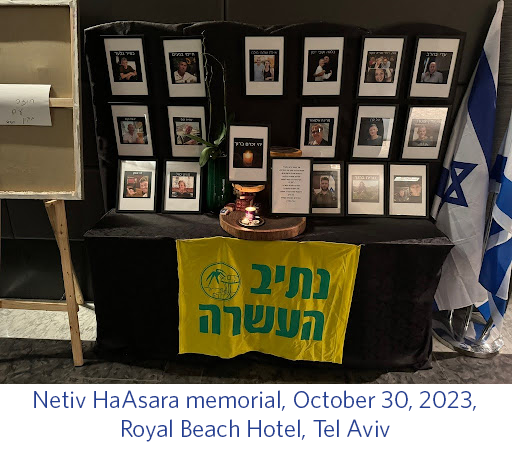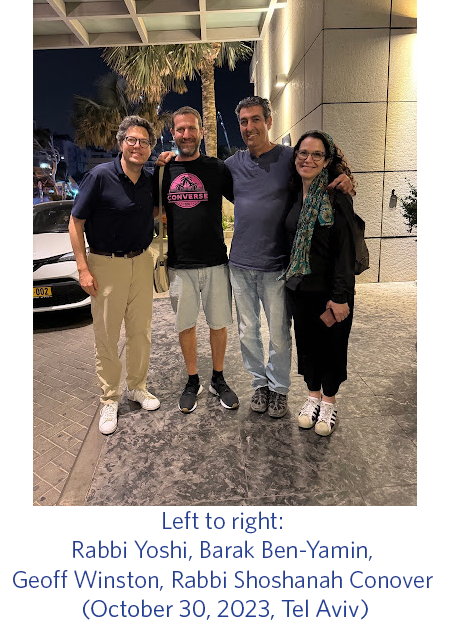In late October 2023, I traveled to Israel. I felt compelled to go. I needed to see my family and friends. I needed to stand with them in solidarity, to show my support, to volunteer, to help in some small way, and to bear witness. It was a hard visit, but an urgent one.
 One of the most powerful and painful encounters I had on my trip was with Barak Ben-Yamin, brother-in-law to my dear friend, Geoff Winston, and a member of the Netiv HaAsara community which is just 1,100 feet from the Gaza border. Fourteen members of the Netiv HaAsara community were murdered on October 7th. Barak and his wife and three children managed to survive, locked in the family’s safe room for more than ten hours. That day was pure darkness. There have been many, many hard days since.
One of the most powerful and painful encounters I had on my trip was with Barak Ben-Yamin, brother-in-law to my dear friend, Geoff Winston, and a member of the Netiv HaAsara community which is just 1,100 feet from the Gaza border. Fourteen members of the Netiv HaAsara community were murdered on October 7th. Barak and his wife and three children managed to survive, locked in the family’s safe room for more than ten hours. That day was pure darkness. There have been many, many hard days since.
Barak shared something quite extraordinary with me on that visit. He told me that his wife had grown up in the Netiv HaAsara community. Her parents were members of the original moshav which was founded in 1973 and located in the Sinai Peninsula. It was named the “Path (netiv) of the Ten” in honor of ten paratroopers who were killed in a helicopter accident in 1971.
As part of the peace treaty with Egypt, Israel agreed to evacuate the moshav in 1982 and it was moved to its current location, just that short, short distance from the border with Gaza.
Barak’s father and mother in law were part of the original settlement. They moved to the current location in 1982. They survived October 7th and told Barak, “We rebuilt before. We’ll rebuild again.”
With tears in his eyes, Barak looked at me and said, “But I don’t know if I can do it. I don’t know if I can ever go back.”
I was in touch with Barak this summer and I learned that he and his wife and kids, along with a few dozen other families from the moshav, have relocated to Ashkelon, a 10 mile drive north.
They still don’t know when they might be able to return to their homes at Netiv HaAsara, or if they’ll ever feel safe and comfortable doing so.
 But what they do know is that Israel is their home; the place that they want to raise their families, the place where they want to live their lives in peace and security. And they know that what got them through this past year more than anything is the strength provided from their local and global communities. Barak taught me a lot about resilience, strength, hope, and community.
But what they do know is that Israel is their home; the place that they want to raise their families, the place where they want to live their lives in peace and security. And they know that what got them through this past year more than anything is the strength provided from their local and global communities. Barak taught me a lot about resilience, strength, hope, and community.
As we prepare for the High Holy Days, as we begin to reflect more deeply on the year that has passed and the ways that we have fallen short or gone astray, these themes feel as urgent and important as ever. As we prepare for Selichot, the worship that leads us into the Ten Days of Repentance, we are especially mindful of the work of repair and how difficult it can be, particularly in this moment.
We have experienced–collectively–unspeakable trauma. But together, we can rebuild. Together we can find strength. Together we can find meaning and purpose even in the midst of darkness and despair. Together we can repair at least some of what is broken.
This is the netiv, the path, that can enable us to move forward to meaning, to healing, to life.
–Rabbi Yoshi Zweiback
